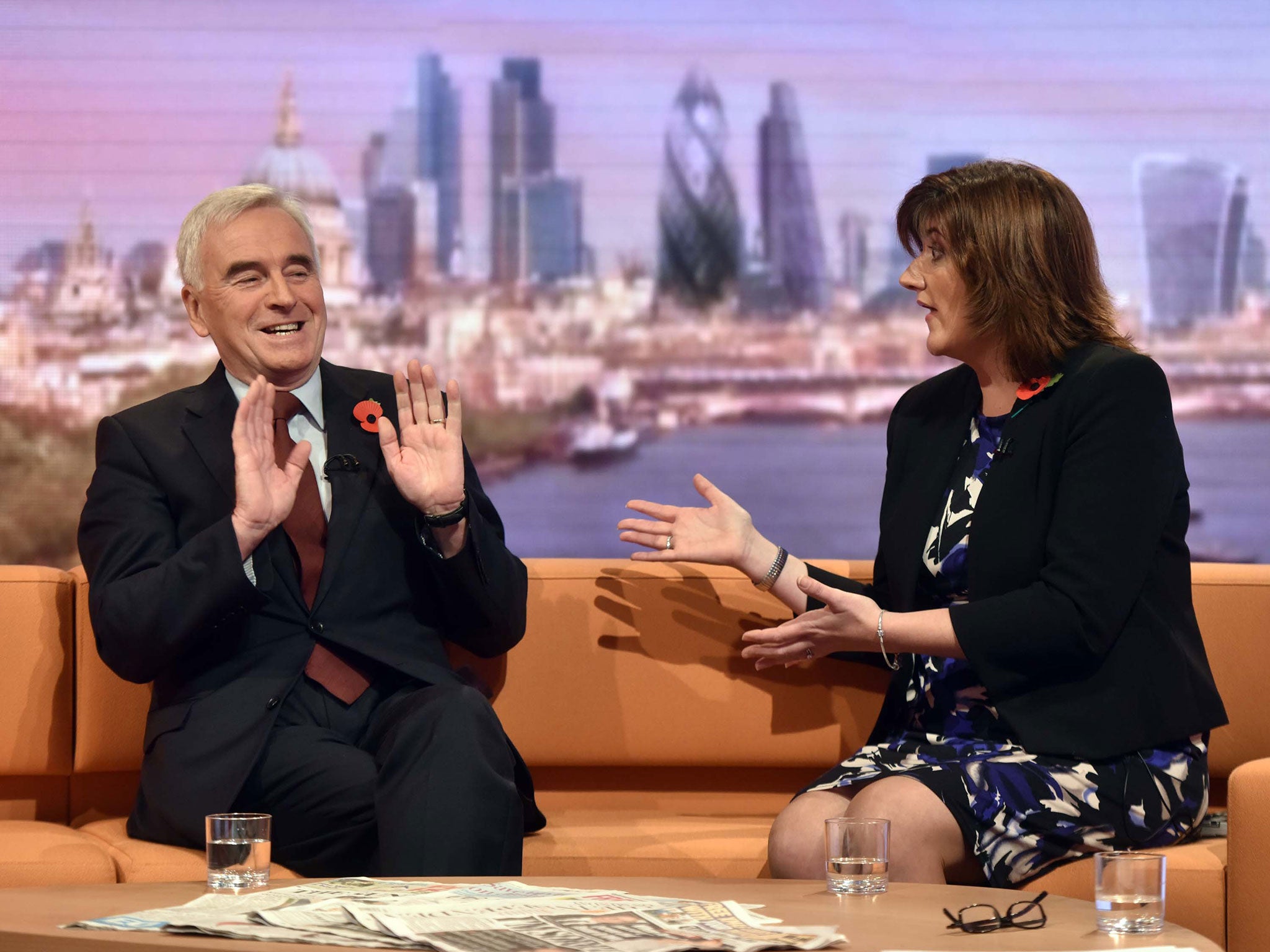John McDonnell says Labour will not attack George Osborne if he backs down on tax credit cuts
McDonnell made the offer on the eve of a House of Lords vote which threatens to set off a constitutional crisis

George Osborne has been told that he can back down over his attack on tax credits for the working poor without the risk that Labour will taunt for making a U-turn.
Labour’s shadow Chancellor, John McDonnell, made the extraordinary offer on the eve of a House of Lords vote which threatens to set off a constitutional crisis, with Conservative leaders alleging that a vote against the Government will be a breach of a long-standing convention that governs relations between the two Houses of Parliament.
The Chancellor’s planned reduction in tax credits would contribute more than £4bn to the £14bn he has pledged to cut from the annual welfare budget, but would cost 3.2 million families living on low pay an average of £1,300 a year. According to figures obtained from the Commons Library by Labour’s shadow health secretary, Heidi Alexander, by 2020, without tax credits, an NHS nurse with two children for instance will be £1,286 a year worse off.
Labour and Liberal Democrat peers, who outnumber Conservatives in the House of Lords, have been told by their party leaders to vote against the measure when it comes before them on 26 October, defying a convention that peers do not try to obstruct financial legislation.
John McDonnell – who has made a U-turn during the brief time he has been shadow Chancellor over whether to vote against austerity measures – promised that Labour will not gloat if George Osborne decides to think again.
In a letter to the Chancellor, he wrote: “I am appealing to you to put the interests of these three million families ahead of any concerns you may have about losing face and ahead of petty party politics. If you do, I promise you personally and publicly that if you reverse this decision in full, I will not attack you for it.”
He added: “It can’t be a fudge. Not some partial reversal that scores cheap headlines, yet leaves people still worse off or lands another burden on middle and low earners or the poorest.”
The Conservatives have claimed that increasing the national minimum wage, raising the tax threshold and other measures, combined with an expanding economy, will eventually make up the loss.
The abrupt removal of tax credits has created concern in Tory ranks, with cabinet ministers privately briefing that they are worried by its impact on the working poor. Ruth Davidson, leader of the Scottish Tories, has warned: “The aim is sound, but we can’t have people suffering on the way.” Writing for the CapX website, David Davis, David Cameron’s main rival in the 2005 leadership election, upheld the right of the House of Lords to challenge the measure, because – he claimed – the Commons had not been allowed to debate it properly.
Defending the cuts, the Education Secretary Nicky Morgan told the BBC’s Andrew Marr Show: “It’s inevitable that people are going to be worried. I will have constituents coming to me, as other MPs will, but it’s a question of working through all of the numbers.”
She added: “What is the alternative? We have to get the economy straight. We have to pay off what we owe as a country for our next generation. We otherwise will have this debt going on and on and on for our children.”
She added, however, that the Chancellor was in “listening mode” over mounting Tory demands for action to soften the impact of tax credit cuts on low-income households.
“The Chancellor’s track record has very much been about supporting, in budgets, working families,” she said.
The former Tory Chancellor, Kenneth Clarke, also defended Mr Osborne. He claimed that tax credits were a way of “subsidising a low-pay, low-productivity economy” and that cutting them and raising the minimum wage would give employers an incentive to deploy their workforces more efficiently. He complained: “We live in an age of short-term populism. Nowadays everybody expects the Budget to be just full of popular measures.”
Mr Davis and the Conservative London mayoral candidate Zac Goldsmith have joined forces with Labour’s former welfare minister Frank Field on a cross-party motion calling for action to protect poorer families. It will be put to a non-binding vote in the Commons on 29 October.
The Tory former cabinet minister Lord Heseltine said fellow peers were “playing with fire” by threatening to block the reforms.
“The Commons are going to win this issue one way or another but the most likely losers are the House of Lords themselves who will find their powers curtailed or stripped or whatever it may be,” he told Sky News.
The former Conservative leader Lord Howard said there were “quite likely to be consequences” and the Tory Jacob Rees-Mogg said it would be “perfectly proper” to flood the upper chamber with new Tory peers to ensure a government majority.
But Mr Davis dismissed that prospect which he said would be seen as “one of the biggest acts of constitutional vandalism in modern times”.
Join our commenting forum
Join thought-provoking conversations, follow other Independent readers and see their replies
Comments
Bookmark popover
Removed from bookmarks